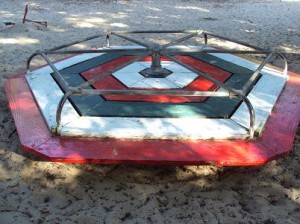When Skylar and Micah were here (ages 3 and 18 months), we frequently walked to a nearby playground to ride a small merry-go-round. It had no ponies, brass poles or circus music, just boards to sit on and painted pipes to hold. Their daddy spun it again and again, and we all enjoyed their grins and giggles.
One day we decided to give them a real merry-go-round ride and drove 20 minutes to a giant beachfront carousel. Although we’d talked about it ahead of time, seeing the massive horses (lions, birds and dinosaurs) concerned them. Both wore serious expressions as we waited in line.
When it was their turn, they were skeptical but did want a closer look. And then we were moving, the kids atop bejeweled steeds with their manes flying and teeth showing. At one point Skylar said, “Can I get off now?”
When it finally stopped, they were both eager to climb down, neither one wanting a second go-round, though back at home they continued to enjoy the simple playground version.
Sometimes less is more.
I discovered that after trying to condense two homes worth of stuff into one. Drawers were so packed they refused to close, and my china cabinet was no longer safe for breakables, which were stacked six deep. But when little by little I eliminated half of everything, open shelf space began to appear, and drawers functioned properly.
I can think of only one instance when more is always better: time spent with God. We’ve all heard Martin Luther’s statement about his daily prayer time. He prayed two hours every morning, unless he faced a busy day. Then he prayed three.
In this high speed era of fast-track education, instant availability, and microwavable dinners, slowing down enough to sit quietly with God for several hours seems unthinkable. Yet he’s the only one who controls the happenstance and opportunity of life. To spend time with him brings direct benefit to us.
But there is some 21st century good news waiting for us on the flip-side of Luther’s long prayer times. If we can’t possibly find two hours, a lesser period of intentional time works, too. God’s influence isn’t limited by less effort on our part.
For example, he can bring eternal life to someone through one scriptural phrase or redirect a life purpose through one whispered sentence. Such awesome work removes our guilt when we wish we could spend more time but just can’t make it happen. God doesn’t want us clocking minutes with him, just to match saints like Luther.
The principle is like being thrilled with a simple wooden merry-go-round, rather than riding on a jewel-studded carousel, anxious to get it over with.
Jesus prayed, “I have made you known to them, [Father], and will continue to make you known in order that the love you have for me may be in them and that I myself may be in them.” (John 17:26)








